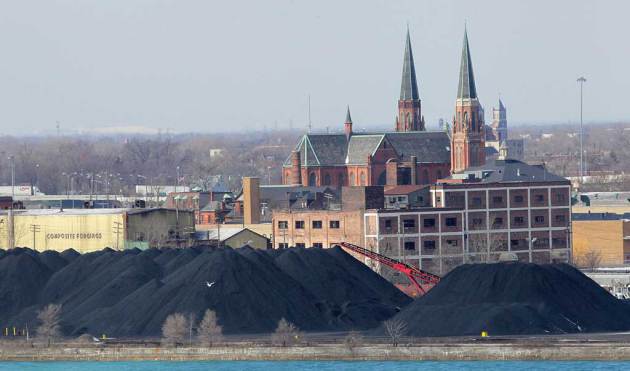
 |
|
|
|
|
|
|
CEA in the News |
 Huge piles of petroleum coke are offloaded at the Transflo Terminal in Detroit on Mar. 8, 2013. (DAN JANISSE/The Windsor Star) Citizens Environment Alliance dismayed by petcoke storage By Chris Thompson, The Windsor Star, Mar 11, 2013 After decades of efforts to clean up the Detroit River, the last thing the Citizens Environment Alliance wanted to learn last week was that petcoke — a nasty byproduct of refining thick Alberta crude — is being stored on the waterway’s American shore. “When you’re trying to do remediation the last thing you want to see is new issues coming forward that are going to hinder the remedial action,” said CEA co-ordinator Derek Coronado at the Alliance’s annual general meeting Monday night at The Kildare House. “This is something that we worked on last year in terms of the expansion of the tar sands throughout the Great Lakes Basin and Enbridge’s Line 9 proposal, the first section was approved by the National Energy Board, that’s between Sarnia and Westover,Ont.” But storing the crude oil byproduct next to a fragile waterway that has been the target of environmental remediation efforts, such as shoreline restoration, caught the group off guard. Although petcoke is not considered toxic or hazardous, it can contain heavy metals or sulphur, and there are fears the dust could be blown into the water. And Coronado fears an Enbridge pipeline that brings Alberta crude through the U.S. will eventually be used to bring the thick oil back into Canada at Sarnia and reverse an existing pipeline to take the crude to Montreal. “Once the soil hits those refiners we’ll see that kind of waste being produced in all of those communities all the way up the line,” said Coronado. “It’s a byproduct of that kind of refining. These are new issues for the regulators to deal with in the Great Lakes. They’re not on top of it, as we’ve seen, on the U.S. side. So we need to be moving forward on the remediation of the Detroit River.” Coronado said another hot issue for the CEA this year will be the ongoing approval process for the Fermi 3 nuclear reactor at the western end of Lake Erie near Monroe, Mich. Last month the CEA joined a number of groups in the U.S. in filing a number of legal contentions with the U.S. Nuclear Regulatory Commission and the Atomic Safety and Licensing Board over the inadequacy of nuclear waste storage, a projected lower demand for electricity and thus no need for the new reactor, and the lack of a review for the transmission corridor. Coronado said the CEA wants the International Joint Commission, the binational body that oversees common waters between Canada and the U.S., to reconstitute its defunct nuclear task force. “We’d like to see the return of the nuclear task force that the IJC used to have, to focus on protecting Great Lakes issues as well,” said Coronado. “One of the major potential sources of toxins for the Great Lakes is nuclear because on top of all that we’re also seeing nuclear waste site proposals coming forward in Ontario.” Coronado said the CEA will also continue to work on municipal issues through the Windsor-Essex Environment Committee, a number of provincial issues and will also keep tabs on the issue of algae in Lake Erie. © Copyright (c) The Windsor Star |